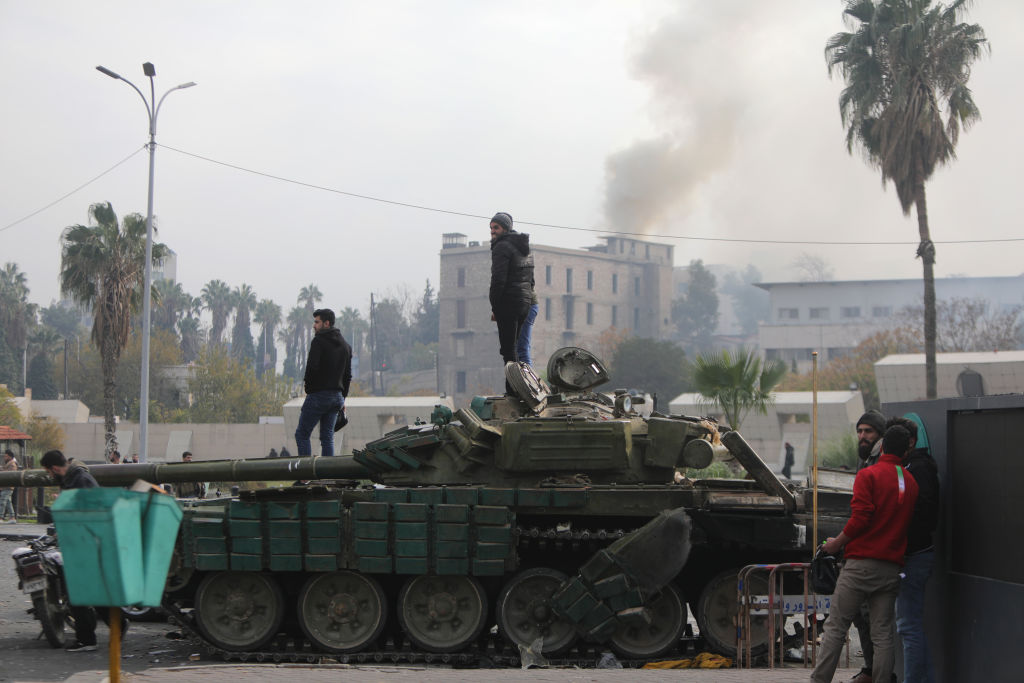As the commander of al Qaeda’s franchise in the Syrian civil war, Abu Mohammed al-Golani was a shadowy figure who kept out of the public eye, even when his group became the most powerful faction fighting to topple Bashar al-Assad.
Today, he is the most recognisable of Syria’s triumphant rebels, having gradually stepped into the limelight since severing ties to al Qaeda in 2016, rebranding his group, and leading the rebels who ousted Assad after 13 years of civil war.
“The future is ours,“ Golani, now going by his real name Ahmed al-Sharaa, said in a statement read on Syria’s state TV, underlining the central role he is expected to play as Syria turns the page on 50 years of Assad family rule.
Signalling his efforts to secure an orderly transition, he declared Syrian state institutions would remain under the supervision of the Assad-appointed prime minister until a handover.
Dressed in military fatigues, he also visited the 8th century Umayyad Mosque in the Old City of Damascus, accompanied by supporters who filmed the moment to chants of “God is Great“.
Golani is leader of the Hayat Tahrir al-Sham (HTS) rebel faction, formerly known as the Nusra Front and designated a terrorist group by much of the world.
Seeking to assure Syrian minorities who have long feared jihadist rule, Golani issued a steady stream of reassuring messages as insurgents began their lightning advance less than two weeks ago, promising them protection.
“Golani has been smarter than Assad. He’s retooled, he’s refashioned, made new allies, and come out with his charm offensive” towards minorities, said Joshua Landis, a Syria expert and head of the Center for Middle East Studies at the University of Oklahoma.
PR EFFORT?
Aron Lund, a fellow at think-tank Century International, said Golani and HTS had clearly changed though remained “pretty hardline”.
“It’s PR, but the fact they are engaging in this effort at all shows they are no longer as rigid as they once were. Old-school al Qaeda or the Islamic State would never have done that,” he said.
Golani and the Nusra Front emerged as the most powerful of the multitude of rebel factions that sprang up in the early days of the insurgency against Assad over a decade ago.
Before founding the Nusra Front, Golani had fought for al Qaeda in Iraq, where he spent five years in a U.S. prison. He returned to Syria once the uprising began, sent by the leader of the Islamic State group in Iraq at the time – Abu Omar al-Baghdadi – to build up al Qaeda’s presence.
The U.S. designated Golani a terrorist in 2013, saying al Qaeda in Iraq had tasked him with overthrowing Assad’s rule and establishing Islamic sharia law in Syria, and that Nusra had carried out suicide attacks that killed civilians and espoused a violent sectarian vision.
Turkey, the Syrian opposition’s main foreign backer, has designated HTS a terrorist group, while supporting some of the other factions that fight alongside it.
Golani gave his first media interview in 2013, his face wrapped in a dark scarf and showing only his back to the camera. Speaking to Al Jazeera, he called for Syria to be run according to sharia law.
Some eight years later, he sat down for an interview with the U.S. Public Broadcasting Service’s FRONTLINE programme, facing the camera and wearing a shirt and jacket.
Golani said the terrorist designation was unfair and that he opposed the killing of innocent people.
He detailed how the Nusra Front had expanded from the six men who accompanied him from Iraq to 5,000 within a year.
But he said that his group had never presented a threat to the West. “I repeat – our involvement with al Qaeda has ended, and even when we were with al Qaeda we were against carrying out operations outside of Syria.“
MESSAGES TO MINORITIES
Golani fought a bloody war against his old ally Baghdadi after Islamic State sought to unilaterally subsume the Nusra Front in 2013. Despite its al Qaeda ties, Nusra was regarded as more tolerant and less heavy handed in dealings with civilians and other rebel groups compared to Islamic State.
Islamic State was subsequently beaten out of territory it held in both Syria and Iraq by an array of adversaries including a U.S.-led military alliance.
As Islamic State was collapsing, Golani was cementing the grip of HTS in the northwestern Syrian province of Idlib, establishing a civil administration called the Salvation Government.
Assad’s government viewed HTS as terrorists, along with the rest of the rebels.
With the Sunni Muslim rebels now in control, the HTS administration has issued statements seeking to assure Assad’s Alawite sect, Christians, and other minorities. One statement urged the Alawites to be a part of a future Syria that “does not recognise sectarianism”.
In a message to residents of a Christian town south of Aleppo, Golani said they would be protected and their property safeguarded, urging them to remain in their homes and to reject the Syrian government’s “psychological warfare”.
“He’s really important. The main rebel leader in Syria, the most powerful Islamist,” said Lund.
He said HTS had displayed “logistical and governance capacity” by ruling its own territory in Idlib for years.
“They have adopted the symbols of the wider Syrian uprising… which they now use and try to claim the revolutionary legacy – that ‘we are part of the movement of 2011, the people who rose up against Assad, and we are also Islamists’.”
(Reuters)














